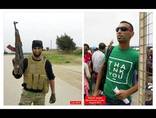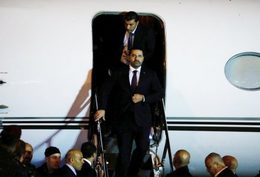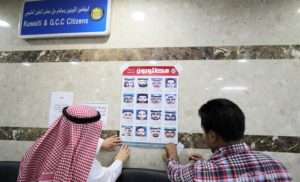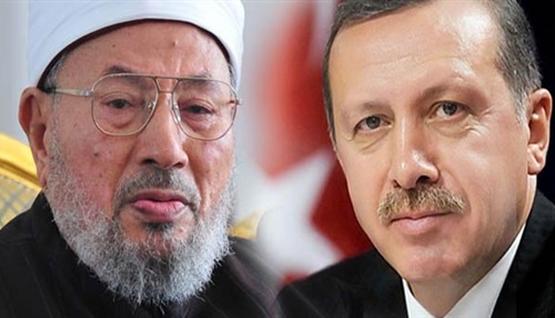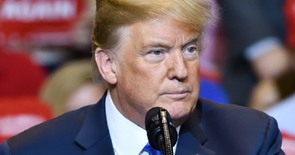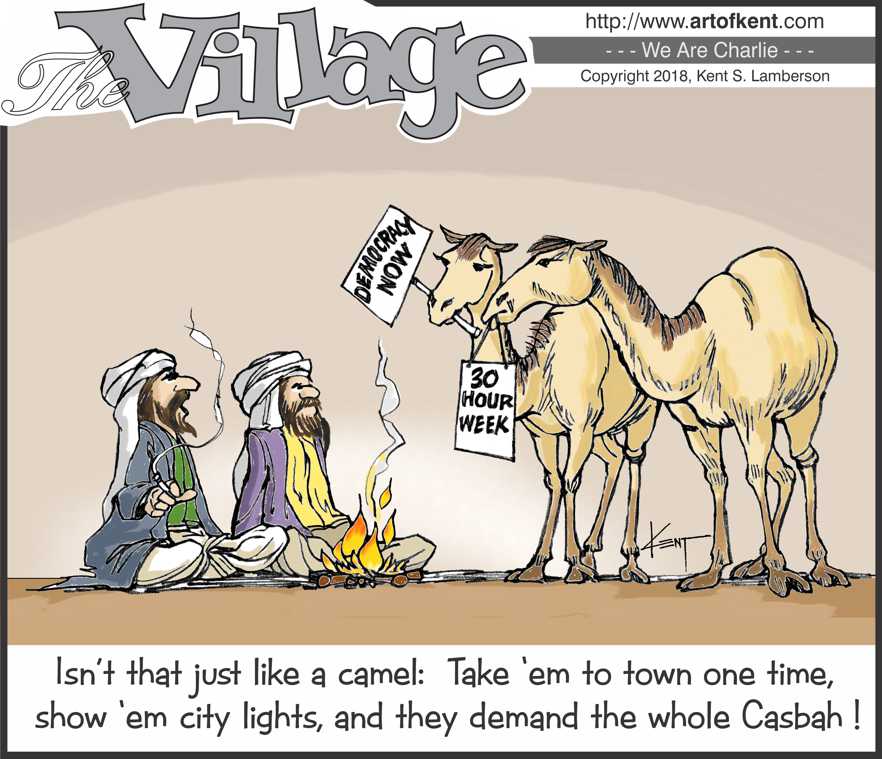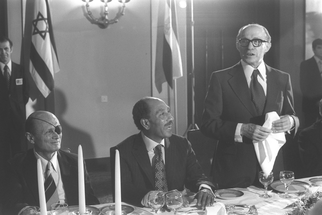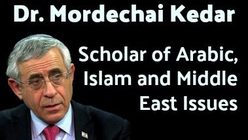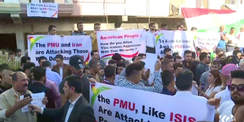PJTN TV
Why the new Middle East peace plan that was just proposed by Netanyahu and Trump won't work...and it might not be the reason that you would think!!! Please take a few minutes to watch this message and if you feel so inclined, please SHARE on your social media, we need to get the word out there! The Palestinians do not want peace, they want to keep their people in squalor as a ploy to deceive the world and paint Israel in a way that will turn the nations against her. This is why they are rejecting the peace plan and have rejected all past peace plans and will continue to do so!
Why the new Middle East peace plan that was just proposed by Netanyahu and Trump won't work...and it might not be the reason that you would think!!! Please take a few minutes to watch this message and if you feel so inclined, please SHARE on your social media, we need to get the word out there! The Palestinians do not want peace, they want to keep their people in squalor as a ploy to deceive the world and paint Israel in a way that will turn the nations against her. This is why they are rejecting the peace plan and have rejected all past peace plans and will continue to do so!
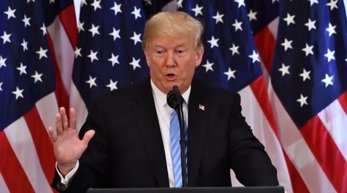
Trump responds to critics of his withdrawal of troops from Syria
December 25, 2018 Evan El-Amin / Shutterstock.com President Donald Trump responded to critics who have denounced his decision to withdraw U.S. troops from Syria on Thursday, publishing a series of tweets with an accompanying video explaining the historic decision on Thursday. “Does the USA want to be the Policeman of the Middle East, getting NOTHING but spending precious lives and trillions of dollars protecting others who, in almost all cases, do not appreciate what we are doing?” the president wrote on Twitter. “Do we want to be there forever?” Executive rebuttal The president was responding to a bipartisan backlash from congressional war hawks and members of the Department of Defense who oppose the troop withdrawal. Defense Secretary Jim Mattis resigned on Thursday over Trump’s decision, a day after the president announced that he planned to bring home all 2,000 U.S. service members working as advisors to the Syrian Defense Forces and local militias battling the Islamic State. The sudden and unexpected troop displacement caught some in the military by surprise, including Chairman of the Joint Chiefs of Staff Gen. Joseph Dunford, who said that he was not informed of the foreign policy decision and only found out when the news was made public. However, Trump reminded his critics that he has campaigned on the promise to pull out of the Middle East “for years,” and White House Chief of Staff Mick Mulvaney reiterated that point during a Sunday interview with Fox News. “This is not a snap decision. And it’s not a surprise to anybody because it’s exactly what the president said he was going to do,” Mulvaney said. “If a Cabinet secretary simply has such a misalignment with the president’s priorities that he cannot serve him, that is the right reason to leave.” A sacred duty If Trump’s decision to leave Syria after defeating ISIS is popular with American voters, members of Congress don’t seem to notice. Even allies like Sen. Lindsey Graham (R-S.C.) slammed the order as “a huge Obama-like mistake,” and Sen. Pat Toomey (R-Pa.) reminded the president that he was alone among lawmakers in wanting to exit the region. “I think Gen. Mattis has put his finger on where the president has views that are very, very distinct from the vast majority of Republicans and probably Democrats, elected and unelected,” Toomey said. However, Graham, Toomey and other legislators who oppose the withdrawal aren’t faced with the heart-wrenching task of notifying the next-of-kin of those soldiers, sailors, airmen and Marines killed in combat. Trump reminded his critics of this solemn obligation — a duty that he alone must bear in times of war. “I get very saddened when I have to write letters or call parents, or wives, or husbands of soldiers who have been killed fighting for our country,” he said during his videotaped address. “It’s a great honor. We cherish them. But it’s heartbreaking. There’s no question about it. It’s heartbreaking.” Naysayers Congressional Democrats are using the Syria withdrawal to sow disfavor with the Trump administration. Sen. Dick Durbin of Illinois, who previously held President Barack Obama to his promise not to put “boots on the ground” in Syria, is suddenly concerned that “the president is making life or death decisions about national security” without the advice of Gen. Mattis. After Obama decided to bomb Syria in 2014 against the guidance of many Democrats, Durbin insisted that “a true leader has to step up and do what he thinks is right.” The senator even lamented that he has “been to too many funerals, visited too many disabled veterans, to ever want to see us” deploy troops to the region again. Trump is only doing what his worst critics have asked of him by sending American service members home after years of fighting. He campaigned on the promise to avoid foreign entanglements, and the president is simply reminding fellow lawmakers that he is going to do what is right — even if it is also unpopular. ____________________________ Saudi Arabia is building a $500 billion mega-city that's 33 times the size of New York City
Leanna Garfield, Business Insider Wednesday 28 February 2018 15:02 GMT
Now the Saudi Arabian government has come up with a project that could give its economy a boost: a $500 billion mega-city that will connect to Jordan and Egypt and be powered completely by renewable energy. In October 2017, Saudi Crown Prince Mohammed bin Salman announced the project, called NEOM, at the Future Investment Initiative conference in Riyadh. It will be financed by the Saudi government and private investors, according to Reuters. The country is now starting to award contracts to local construction companies for the development of five palaces. Set to be located on the Red Sea coast, the palaces will be for the king, crown prince, and other senior royals. According to Reuters, the buildings will feature traditional Moroccan-style architecture, Islamic designs, and colorful ceramic tiles. The complex of palaces will include a marina, helipads, and a golf course. The business and industrial-focused city will span 10,230 square miles. To put that size in perspective, 10,230 square miles is more than 33 times the land area of New York City. A screenshot from the "Discover NEOM" website. Discover NEOMNEOM's larger goal is to lessen Saudi Arabia's reliance on oil exports, which could expand the country's economy beyond oil, bin Salman said at the conference in October. The city will focus on a variety of industries, including energy and water, biotechnology, food, advanced manufacturing, and entertainment. Saudi Arabia hasn't released a masterplan yet for what it will look like. The country appointed Klaus Kleinfeld, a former chief executive of Siemens AG and Alcoa Inc, to run the NEOM project. Officials hope that a funding program, which includes selling 5% of oil giant Saudi Aramco, will raise $300 billion for NEOM's construction. Saudi Crown Prince Mohammed bin Salman, Masayoshi Son, SoftBank Group Corp. Chairman and CEO, and Christine Lagarde, International Monetary Fund (IMF) Managing Director, attend the Future Investment Initiative conference in Riyadh, Saudi Arabia October 24, 2017. ReutersThe project could make NEOM one of the largest cities to run without fossil fuels. In the US, one of the largest cities to run on 100% renewable energy is Burlington, Vermont, which doesn't come close to the planned size of NEOM. Cities in Iceland and Norway also claim to be close to achieving entirely renewable electrical grids with help from natural resources like hydropower and geothermal heat. Saudi Arabia expects to complete NEOM's first section by 2025. "This place is not for conventional people or conventional companies, this will be a place for the dreamers for the world," bin Salman said on a panel at the conference. "The strong political will and the desire of a nation. All the success factors are there to create something big in Saudi Arabia." Read more: ________________________ 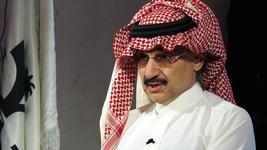
Jailed Prince Alwaleed bin Talal, Saudi Arabia's richest man, is running out of time to make a deal
Jake Novak | @jakejakeny Published 10 Hours Ago Updated 4 Hours AgoCNBC.com Mary Catherine Wellons | CNBC Saudi Prince Alwaleed bin Talal.Saudi Arabia's richest man is running out of time. It's been more than two months since Prince Alwaleed bin Talal was first arrested and detained in what the Saudi government still calls an "anti-corruption" sweep. Yet the first sign of things getting more serious came early this week when Alwaleed was moved out of his restricted quarters at the Riyadh Ritz Carlton Hotel and moved to Al Ha'ir prison, according to the London-based Arabic news site Al-Araby Al-Jadeed. Al Ha'ir is not exactly the Bastille, but the decision to get Alwaleed to a more secluded and secure location is ominous. For more than two months, the prince had been held at the Riyadh Ritz along with what had originally been 200 of his fellow princes and top officials. That number has dwindled to just a few prisoners. Most of the former detainees have bought their freedom with payments and other forms of capitulation to the new Saudi Crown Prince Mohammed bin Salman. But bin Talal is holding out, reportedly balking at the $6 billion bin Salman is demanding from him and/or control of some of his investment companies. Prince bin Salman came to power last summer when King Salman made the extremely unusual move to change the order of succession and make bin Salman crown prince. Since then he has been beefing up Saudi Arabia's military defenses against Iran, strengthening ties to the U.S. and even Israel in the process. In the fall, he further moved to purge the country of anti-Semitic and anti-American Islamic clerics. In November, bin Salman's economic reforms morphed into this arrest of Alwaleed and those 200 other princes and officials who were at least potential rivals in the overall power grab. Prince Alwaleed Bin Talal among arrested in Saudi Arabia 3:19 AM ET Mon, 6 Nov 2017 | 03:29It's not that many of the crown prince's goals aren't prudent or even admirable. But the matter of human rights is being pushed aside. So is due process. Another example of that happened this week with the Saudi government's outright seizure of the Binladin Group construction giant. A Reuters report says the government has taken managerial control and may also erase up to $30 billion in debt it owes the company. This is happening as leading members of the Bin Laden family, yes the extended family of al Qaeda founder Osama bin Laden, were detained as well. One of the most stunning aspects of bin Talal's detention is how quiet his long list of influential friends have been about it. This week brought at least some mention of his plight with a statement from two former French presidents who expressed concern over Alwaleed's status. But let's face it: a few words from a couple of French ex-presidents is peanuts. So now we have bin Alwaleed in an actual prison, with a government aggressively taking cash and assets, and still no significant outcry from his foreign friends. It may seem unrelated, but bin Salman has also been on an opulent buying spree. That includes record-breaking purchases of art, a yacht and a French chateau. It begs the question of whether some of this stems from his desire to be the most conspicuously wealthy leader in the country. This is similar to some of the tactics Russian President Vladimir Putin has used to consolidate his political power and personal wealth at the same time. None of this very public behavior is drawing public rebuke from the crown prince's friends in Trump administration and elsewhere. They are clearly okay with the ends justifying whatever means he's using to modernize the country and strengthen its ability to oppose Iran. The fact that the lucrative Saudi Aramco IPO is coming soon could be another reason that Alwaleed's supposed friends in the world of finance aren't making a public stink. They want to curry favor with the Saudis now to gain access. This week's moves only drives that point home. Prince Alwaleed's leverage to demand an actual trial or negotiate a better deal is dwindling by the day. The cavalry is not coming and the Saudi government has almost no fear of international reprisal. The chances are greater than ever that Alwaleed will now rot in a literal jail for as long as the new government wants. Earlier reports that he was being hung upside down and beaten at the Ritz Carlton are still unconfirmed, but no one should be surprised if that's the next step – if it hasn't been taken already. Prince Alwaleed must have thought at some point that he had the option of holding out for a fair hearing before being forced to hand over billions to save his skin. He doesn't have that option now and probably never did. Crown Prince Mohammed bin Salman isn't betting on seeing any pushback. Neither should anyone else. Commentary by Jake Novak, CNBC.com senior columnist. Follow him on Twitter @jakejakeny. ___________________________ 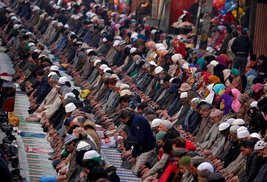 Muslims praying at the shrine of a Sufi saint on Wednesday in Srinagar, Kashmir.CreditDanish Ismail/Reuters Muslims praying at the shrine of a Sufi saint on Wednesday in Srinagar, Kashmir.CreditDanish Ismail/Reuters
Who Are Sufi Muslims and Why Do Some Extremists Hate Them?
By MEGAN SPECIA NOV. 24, 2017 Sufism is a mystical form of Islam, a school of practice that emphasizes the inward search for God and shuns materialism. It has produced some of the world’s most beloved literature, like the love poems of the 13th century Iranian jurist Rumi. Its modern-day adherents cherish tolerance and pluralism, qualities that in many religions unsettle extremists. But Sufism, often known as Islamic mysticism, has come under violent attack in recent years. On Friday, militants stormed a Sufi mosque on the Sinai Peninsula, killing at least 305 people in what officials are calling the worst terrorist attack in Egypt’s modern history. The attack followed several assaults on Sufi shrines in Pakistan over the past year carried out by Sunni extremists. (The vast majority of Sufis are Sunni, though some are Shiite.) What is this form of Islamic belief, and why has it come under assault? PhotoSufis during a religious festival this month in Lahore, Pakistan. CreditArif Ali/Agence France-Presse — Getty Images The roots and practices of SufismSufism, known as tasawwuf in the Arabic-speaking world, is a form of Islamic mysticism that emphasizes introspection and spiritual closeness with God. While it is sometimes misunderstood as a sect of Islam, it is actually a broader style of worship that transcends sects, directing followers’ attention inward. Sufi practice focuses on the renunciation of worldly things, purification of the soul and the mystical contemplation of God’s nature. Followers try to get closer to God by seeking spiritual learning known as tariqa. Confusion about Sufism is common, even among Muslims, according to Imam Feisal Abdul Rauf, an American Sufi cleric of Egyptian descent who preached in New York City for many years and founded the Cordoba House, which promotes a moderate image of Islam in the West. Continue reading the main story“It is nothing more than the spiritual dimension” of Islam, the cleric, who goes by Imam Feisal, said in a phone interview. “It is Islam, but we focus on meditation, on chanting sessions, which enable the Muslim to have his or her heart open. The myths people have about Sufis are analogous to the myths people have about Muslims.” For a time, beginning in the 12th century, Sufism was a mainstay of the social order for Islamic civilization, and since that time it has spread throughout the Muslim world, and to China, West Africa and the United States. As Sufism spread, it adapted elements of local culture and belief, making it a popular practice. Alexander D. Knysh, a professor of Islamic studies at the University of Michigan and expert in modern Sufism, describes it as a “very wide, amorphous movement” practiced within both the Sunni and Shiite traditions. Sufism has shaped literature and art for centuries, and is associated with many of the most resonant pieces of Islam’s “golden age,” lasting from roughly the eighth through 13th centuries, including the poetry of Rumi. In modern times, the predominant view of Sufi Islam is one of “love, peace, tolerance,” Mr. Knysh explained, leading to this style of worship becoming synonymous with peace-loving Islam. PhotoA funeral for victims of a suicide bombing targeting Sufi Muslims in Pakistan in February.CreditAsif Hassan/Agence France-Presse — Getty Images Why extremists have targeted SufisWhile some Muslims view Sufis as quirky, even eccentric, some fundamentalists and extremists see Sufism as a threat, and its adherents as heretics or apostates. In February, militants aligned with the Islamic State attacked worshipers at the tomb of a Sufi philosopher in a remote part of southern Pakistan, killing more than 80 people, whom the militants described as polytheists. Sufis praying at the tombs of saints — a practice core to the group — have also been attacked in India and the Middle East. The Islamic State targets Sufis because it believes that only a fundamentalist form of Sunni Islam is valid. Some fundamentalists see the reverence for saints, which is common in Shiite Islam, as a form of idolatry, because in their view it shows devotion to something other than the worship of a singular God. Some consider Sufis to be apostate, because saints were not part of the original practice of Islam at the time of the Prophet Muhammad, who died in 632. “The opponents of Sufism see the shrines and these living saints as idols,” Mr. Knysh explained. “Their existence and their worship violates the main principle of Islam, which is the uniqueness of God and the uniqueness of the object of worship.” Even though Sunni hard-liners have long viewed Sufis as well as Shiites as heretical, terrorist networks like Al Qaeda and the Islamic State have debated whether killing them is justified. The two terrorist groups have clashed over whether to focus on the “far enemy,” powerful Western countries like the United States, or the “near enemy,” repressive governments in the Muslim world. Early in the Iraq war, when the Islamic State’s predecessor organization targeted Iraq’s Shiite majority, in the hopes of promoting sectarian conflict, Al Qaeda criticized the Iraqi group’s leader at the time, Abu Musab al-Zarqawi, for doing so. When a branch of Al Qaeda captured northern Mali in 2012, militants used pickaxes and bulldozers to destroy the ancient mausoleums of Sufi saints in Timbuktu. But documents recovered in northern Mali revealed that the militants in Mali had acted without the permission of their leaders, who wrote to express their dismay, arguing that the destruction — while theologically justified — was unwise because it caused the population to turn against them. Though Al Qaeda has also targeted Sufi sites, the Islamic State has set itself apart by calling for brutal attacks against Sufis. PhotoA Sufi religious festival in Tanta, Egypt, in 2008. CreditShawn Baldwin for The New York Times The status of Sufis in EgyptWhile no group has yet claimed responsibility for Friday’s attack, it bore some of the hallmarks of previous assaults on Coptic Christians in Egypt. In the fall of 2016, Islamic State’s local affiliate claimed to have executed a Sufi cleric who was about 100 years old. The religious objections of fundamentalists to the Sufi style of worship may not be the only factor behind the attacks on Sufis. Experts say the amicable ties between Sufis and the Egyptian government may also be factor, giving the attack a political dimension. Egypt’s president, Abdel Fattah el-Sisi, who took power after the military overthrew a democratically elected Islamist president, Mohamed Morsi, has vowed to do a better job at protecting religious minorities, who were shunned when Mr. Morsi’s party, the Muslim Brotherhood, was in power. By killing Sufis, the militants may be trying to undermine Mr. Sisi’s authority. Like its counterparts in several other Muslim-majority countries, Egypt’s government supports the Sufis because it sees them as members of a moderate, manageable faction who are unlikely to engage in political activity, because their priorities are oriented inwardly. Sufi sheikhs generally accept the legitimacy of the state, leading to tensions with Muslims who oppose their governments and are willing to act on their dissatisfaction — with violence if necessary. “They think the society is moving in the wrong direction and Sufis are aiding and abetting the authorities on this corrupt path,” Mr. Knysh said. “In ways, their reasons are very much political. They say, ‘If Sufis support this, we will be against them,’ more or less.” Imam Feisal said that attacks on Sufi worshipers, besides being a “major sin,” are the result of the politicization of religion in the region over the past few decades. Egypt, in particular, he said, is a place where that politicization has fueled extremism. “When religion becomes politicized,” Imam Feisal said, “it is not good.” Follow Megan Specia on Twitter @meganspecia. ___________________________ 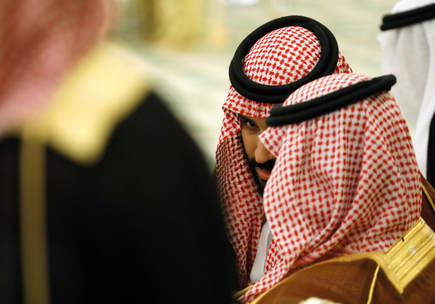 Saudi Arabia's Crown Prince and Minister of Defense Mohammed bin Salman attends a signing ceremony between US President Donald Trump and Saudi Arabia's King Salman bin Abdulaziz Al Saud (not pictured) at the Royal Court in Riyadh, Saudi Arabia May 20, 2017. (photo credit:REUTERS) Saudi Arabia's Crown Prince and Minister of Defense Mohammed bin Salman attends a signing ceremony between US President Donald Trump and Saudi Arabia's King Salman bin Abdulaziz Al Saud (not pictured) at the Royal Court in Riyadh, Saudi Arabia May 20, 2017. (photo credit:REUTERS)
OUR WORLD: SAUDI PURGES AND DUTY TO ACT
BY CAROLINE B. GLICK NOVEMBER 6, 2017 21:33 The recent political shakeup in Saudi Arabia has great implications for the country's future, especially on its relationship with funding terrorist organizations. For 70 years, Saudi Arabia served as the largest and most significant incubator of Sunni jihad. Its Wahhabist Islamic establishment funded radical mosques throughout the world. Saudi princes have supported radical Islamic clerics who have indoctrinated their followers to pursue jihad against the non-Islamic world. Saudi money stands behind most of the radical Islamic groups in the non-Islamic world that have in turn financed terrorist groups like Hamas and al-Qaida and have insulated radical Islam from scrutiny by Western governments and academics. Indeed, Saudi money stands behind the silence of critics of jihadist Islam in universities throughout the Western world. As Mitchell Bard documented in his 2011 book, The Arab Lobby, any power pro-Israel forces in Washington, DC, have developed pales in comparison to the power of Arab forces, led by the Saudi government. Saudi government spending on lobbyists in Washington far outstrips that of any other nation. According to Justice Department disclosures from earlier this year, since 2015, Saudi Arabia vastly increased its spending on influence peddling. According to a report by The Intercept, “Since 2015, the Kingdom has expanded the number of foreign agents on retainer to 145, up from 25 registered agents during the previous two-year period.” Saudi lobbyists shielded the kingdom from serious criticism after 15 of the 19 September 11 hijackers were shown to be Saudi nationals. They blocked a reconsideration of the US’s strategic alliance with Saudi Arabia after the attacks and in subsequent years, even as it was revealed that Princess Haifa, wife of Prince Bandar, the Saudi ambassador to Washington at the time the September 11 attacks occurred, had financially supported two of the hijackers in the months that preceded the attacks. The US position on Saudi Arabia cooled demonstrably during the Obama administration. This cooling was not due to a newfound concern over Saudi financial support for radical Islam in the US. To the contrary, the Obama administration was friendlier to Islamists than any previous administration. Consider the Obama administration’s placement of Muslim Brotherhood supporters in key positions in the federal government. For instance, in 2010, then secretary for Homeland Security Janet Napolitano appointed Mohamed Elibiary to the department’s Homeland Security Advisory Board. Elibiary had a long, open record of support both for the Muslim Brotherhood and for the Iranian regime. In his position he was instrumental in purging discussion of Islam and Jihad from instruction materials used by the US military, law enforcement and intelligence agencies. The Obama administration’s cold relations with the Saudi regime owed to its pronounced desire to ditch the US’s traditional alliance with the Saudis, the Egyptians and the US’s other traditional Sunni allies in favor of an alliance with the Iranian regime. During the same period, the Muslim Brotherhood’s close ties to the Iranian regime became increasingly obvious. Among other indicators, Egypt’s Muslim Brotherhood-affiliated president Mohamed Morsi hosted Iranian leaders in Cairo and was poised to renew Egypt’s diplomatic ties with Iran before he was overthrown by the military in July 2013. Morsi permitted Iranian warships to traverse the Suez Canal for the first time in decades. Saudi Arabia joined Egypt and the United Arab Emirates in designating the Muslim Brotherhood a terrorist group in 2014. It was also during this period that the Saudis began warming their attitude toward Israel. Through Egyptian President Abdel Fattah el-Sisi, and due to Prime Minister Benjamin Netanyahu’s leading role in opposing Iran’s nuclear program and its rising power in the Middle East, the Saudis began changing their positions on Israel. Netanyahu’s long-time foreign policy adviser, Jerusalem Center for Public Affairs president Dr. Dore Gold, who authored the 2003 bestseller Hatred’s Kingdom: How Saudi Arabia Supports the New Global Terrorism which exposed Saudi Arabia’s role in promoting jihadist Islam, spearheaded a process of developing Israel’s security and diplomatic ties with Riyadh. Those ties, which are based on shared opposition to Iran’s regional empowerment, led to the surprising emergence of a working alliance between Saudi Arabia, Egypt and the UAE with Israel during Israel’s 2014 war with Hamas – the Palestinian branch of the Muslim Brotherhood. It is in the context of Saudi Arabia’s reassessment of its interests and realignment of strategic posture in recent years that the dramatic events of the past few days in the kingdom must be seen. Saturday’s sudden announcement that a new anti-corruption panel headed by Crown Prince Mohammed bin Salman, and the near simultaneous announcement of the arrest of more than two dozen royal family members, cabinet ministers and prominent businessmen is predominantly being presented as a power seizure by the crown prince. Amid widespread rumors that King Salman will soon abdicate the throne to his son, it is reasonable for the 32-year-old crown prince to work to neutralize all power centers that could threaten his ascension to the throne. But there is clearly also something strategically more significant going on. While many of the officials arrested over the weekend threaten Mohammed’s power, they aren’t the only ones that he has purged. In September Mohammed arrested some 30 senior Wahhabist clerics and intellectuals. And Saturday’s arrest of the princes, cabinet ministers and business leaders was followed up by further arrests of senior Wahhabist clerics. At the same time, Mohammed has been promoting clerics who espouse tolerance for other religions, including Judaism and Christianity. He has removed the Saudi religious police’s power to conduct arrests and he has taken seemingly credible steps to finally lift the kingdom-wide prohibition on women driving. At the same time, Mohammed has escalated the kingdom’s operations against Iran’s proxies in Yemen. And of course, on Saturday, he staged the resignation of Lebanese Prime Minister Saad Hariri amid Hariri’s allegations that Hezbollah and Iran were plotting his murder, much as they stood behind the 2005 assassination of his father, prime minister Rafiq Hariri. There can be little doubt that there was coordination between the Saudi regime and the Trump administration regarding Saturday’s actions. The timing of the administration’s release last week of most of the files US special forces seized during their 2011 raid of al-Qaida leader Osama bin Laden’s compound in Abbottabad, Pakistan was likely not a coincidence. The files, which the Obama administration refused to release, make clear that Obama’s two chief pretensions – that al-Qaida was a spent force by the time US forces killed bin Laden, and that Iran was interested in moderating its behavior were both untrue. The documents showed that al-Qaida’s operations remained a significant worldwide threat to US interests. And perhaps more significantly, they showed that Iran was al-Qaida’s chief state sponsor. Much of al-Qaida’s leadership, including bin Laden’s sons, operated from Iran. The notion – touted by Obama and his administration – that Shi’ite Iranians and Sunni terrorists from al-Qaida and other groups were incapable of cooperating was demonstrated to be an utter fiction by the documents. Their publication now, as Saudi Arabia takes more determined steps to slash its support for radical Islamists, and separate itself from Wahhabist Islam, draws a clear distinction between Saudi Arabia and Iran. Given Saudi Arabia’s record, and the kingdom’s 70-year alliance with Wahhabist clerics, it is hard to know whether Mohammed’s move signals an irrevocable breach between the House of Saud and the Wahhabists. But the direction is clear. With Hariri’s removal from Lebanon, the lines between the forces of jihad and terrorism led by Iran, and the forces that oppose them are clearer than ever before. And the necessity of acting against the former and helping the latter has similarly never been more obvious.___________________________________________________________ 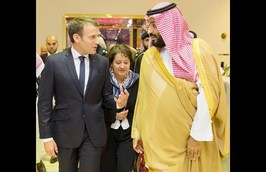
Riyadh ramps up pressure as calls mount for Hariri’s return
Hussein DakroubHasan Lakkis| The Daily Star Saudi Arabia Thursday ramped up pressure on Lebanon to oust Hezbollah from the government amid mounting calls by various political parties, including the Future Movement, for the immediate return of Prime Minister Saad Hariri from Riyadh, less than a week after his surprise resignation sent shockwaves in the country and across the region. ___________________________ 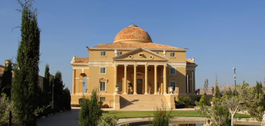
Impoverished Palestinians? Many Arabs in Judea and Samaria enjoy a high standard of life and have no qualms displaying visible signs of affluence.
The economic conditions in Judea and Samaria were not considered newsworthy before June 1967. Jordan controlled Judea and Samaria at that time and anti-Israel activists had nothing to gain by spotlighting the standard of living of Jordanian Arabs living there. After Israel gained control of Judea and Samaria in the Six Day War in 1967, Israel’s detractors sought to malign the Jewish state by claiming that, somehow, the lifestyle of the Arabs there was worse under the Israeli government than Jordanian rule. While Reuters runs headlines like “Palestinians slipping deeper into poverty” and “Impoverished Palestinians sell wedding gold,” watch this video see the true economic situation of Arabs in Judea and Samaria today. ___________________________ 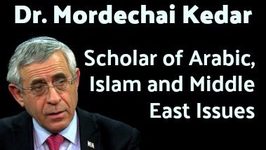
The pilgrimage and the struggle for Islamic Hegemony
It's only fair to share...Wednesday, August 23, 2017, is the first day of Zhu–l-Hijjat, the Muslim month in which two important events take place: The pilgrimage to Mecca, one of the most central of the five Islamic commandments, and the Holiday of the Offering, Id al-Adha, with which it comes to an end. This month is notable in the Muslim world as a result of its religious content, but also due to the political aspects that accompany that content. It is well known that in Islam there can be no separation between religion and state, between religious factors, public issues and politics. The Hajj ceremonies in Mecca and its environs last for nine days, from the first to the ninth of the month, with each day having its own specific rituals. The tenth day marks the start of Id al-Adha, the holiday of the offering, which lasts for four days, until the 13th. The House of Saud appointed itself “guardian of the holy places” in 1925 when it took over the Hajj. It manages the Hajj with a powerful hand, making sure that all pilgrims observe the rituals in the traditional Islamic manner as interpreted by the Saudi monarchy. This fact is of great significance, because it proves that the Saudi ruler, and no one else, is the most important figure in the Islamic world. The decision about when the month of the Hajj begins is an example of this power. The first day of each of the months making up the Islamic year is set by the Sharia court in each country, using the testimony of witnesses who see the new moon with their own eyes and testify to the court. That naturally leads to the months and the 30 day Ramadan fast beginning on different days in various countries, because if it is cloudy and the moon cannot be seen in a specific country, the month is 30 days long, while somewhere else it might be of only 29 days duration. That is why Ramadan, which begins on the first day of the ninth Hajjidic month, does not start on the same day everywhere in the Islamic world. In addition, there are cities, such as Bagdad, where there are both Sunni and Shiite residents with separate courts. Sometimes the Sunnis begin a new month while it is the last day of the previous month for the Shiites living in the same city and sometimes it is the other way around due to the different decisions of their separate courts. This is most conspicuous during Ramadan, when one sect begins to fast while the other is still eating; then at the end of the month when the Eid al Fitr holiday begins, the first group celebrates with food and drink while the second is still fasting. The month of Hajj differs from other months because the entire Islamic world takes part in the pilgrimage and has to accept the Saudi calendar in order to participate in the date-dependent ceremonies. This includes the Shiites, who refuse to recognize Sunni hegemony over holy Islamic sites, but have no choice but to accept Saudi dictation. The Saudis take advantage of their power and stress the unity of Islam achieved during the period of their control. There were years when the Shiites, mainly Iranians, refused to accept Saudi rule and carried out rituals foreign to Sunni tradition, leading to riots and the death of a large number of pilgrims. The rising tensions between Iran and Saudi Arabia as a result of their major conflicts over Syria, Yemen, Iraq and Lebanon, caused Iran’s Supreme Leader, Ayatollah ali Khamenei to fear a bloodbath at the Hajj of 2016. He accordingly moved the pilgrimage site to Karbala, Iraq, where in 680 C.E. Mohammed’s grandson Hussein ben Ali was beheaded by the Sunni Caliph Yazid ben Mu’awiya’s army. One million Iranian pilgrims arrived in Karbala and celebrated the holiday in memory of Hussein ben Ali. Sunni elders, including Egyptian Sheikh Alazar publicized opinions criticizing the Iranian move, accusing Khameini of deepening the schism in Islam. Other Sunnis, mostly Saudi, said that Shiites followed the devil, not Allah, in moving the Hajj from Mecca. The import of this remark is that it implies that the Shiites are not part of Islam and their blood can be spilled with impunity Last year’s dispute poured oil on the fire of inter-Islamic hate and on the wars between Saudi Arabia, representing the Sunnis, and Iran, representing the Shiites. What can we look forward to this year when the Hajj to Mecca approaches? I do not know, but I will not be surprised if the political tension between the Saudis and Iran, particularly after the Sunni ISIS defeats, Shiite Hezbollah victories and Iran’s moving into Iraq, Syria and Lebanon, finds an outlet during the Hajj. It could be in the form of a Shiite boycott of Mecca or Saudi violence against any Shiites who attempt the pilgrimage to Mecca. In June, Jerusalem became the site of the struggle (“Ribat”) between Islam, the religion that expects to take the place of Judaism and Christianity, and Judaism, which is in the midst of a return to its former status as a living, worthy religion. The background of the struggle is the renewal of Jewish sovereignty on the Temple Mount. During the short period of Muslim demonstrations for the right to enter the Al Aqsa Mosque without “Jewish” security checks, Saudi Arabia’s voice was conspicuously absent. The reason for the Saudi silence was the fear that the Muslim Brotherhood and those over whom they hold sway would raise the Al Aqsa Mosque to a level of importance that could contest the centrality of Mecca in Islam. This plan was heard in Muslim Brotherhood media pronouncements. In 2012, for example, Safwat Higazi, the Muslim Brotherhood’s chief spokesman in Egypt, said that the capital of the Islamic Caliphate that can unite all the Arab nations “is not Mecca, not Medina, not Cairo, but Jerusalem. A similar pronouncement was made in 2014, at a demonstration in Jerusalem, by Kamal Khatib, Deputy head of the Northern Branch of the Islamic Movement in Israel, headed by Sheikh Raad Salah, Sheikh Raad Salah himself declared that he intends to bring water from the Zamzam spring in Mecca to pour into the cistern on the Temple Mount in order to sanctify the Al Aqsa Mosque with the holiness of Mecca. The Saudis see this as unacceptable competition and did not permit Salah to attend the Hajj in Mecca. Jerusalem’s challenge to Mecca is also evident in the boycott the Saudis declared on Qatar, a country which publicly supports the Muslim Brotherhood’s offshoots, such as Hamas, for whom the struggle for Jerusalem and Falestin – which they call Aknaf Bayt al-Maqdis – the sectors of Jerusalem – is the raison d’etre. Qatar has even set aside half a billion dollars for the purpose of removing Jerusalem from within Israel’s boundaries. It is using them to buy the media, political figures and organizations like UNESCO Turkey’s Erdogan is playing a role in the struggle for Islamic hegemony by working ceaselessly to strengthen his status as the all-powerful Sultan bringing Turkey back to its status prior to WWI. Erdogan’s hegemonic aspirations clash with the Saudis on points of Muslim memory, because they know full well that for 400 years, Turkey ruled the Hijaz, the territory that included Mecca and Medina, until defeated by the Christian heretics – that is, the British. The victors promptly handed over Islam’s holy land, the Hijaz (Iraq and historic Palestine which includes today’s Jordan) to the Arab friends who had cooperated with them, stabbing the Turks in the back. Today, unsurprisingly, Erdogan supports Qatar, the country the Saudis are trying to bring to its knees. Saudi sensitivity to the Hijaz stems from the fact that the ruling Al-Saud family is not originally from the part of the Hijaz in the western Arabian peninsula, but from the centrally located Najd Heights. The fact that they conquered the area in 1925 from the Sharif’s Notables who claim to be direct descendants of Mohammed, casts a shadow on the Saud family’s legitimacy. This is the reason the Saudi king calls himself “Protector of the holy sites,” intending for that title to grant him “kosher” Islamic status. However, many people in the Sunni world do not buy that and do not entirely accept the Saud family’s right to rule and force their Wahabee Islamic traditions to be the norm at sites that are holy to all Muslims. The Sauds invest large sums of money to maintain the sites so as to gain legitimacy for ruling over Mecca and Medina, building roads, bridges, railways and amenities that make it easier for the two million Muslims whose annual pilgrimages they allow, to be comfortable and secure. Saudi Arabia imports hundreds of thousands of sheep, mainly from Australia, handing them out to the pilgrims for the holiday celebrated on the tenth of the Hajj month. Next month, the Hajj is likely to bring the tensions over Islamic hegemony to a boil, when the internal Islamic rifts described above threaten to destabilize the present situation during the Hajj and due to the Hajj: The ethnic Sunni-Shiite rift parallels the Saudi-Iranian political rift, the Wahabee-Muslim Brotherhood ideological rift, and the historic rift between Turkey and Saudi Arabia. Hopefully, these deep differences will not lead once again to dead and wounded pilgrims, most of whom come only in order to be close to Allah, keep the fundamental commandments connected to the Hajj and obtain forgiveness for their transgressions. They are not interested in all the ethnic, political, ideological and historical considerations involved; all they desire is to come closer to the heavens, keep Allah’s commandments and do Allah’s will. I wish the pilgrims to Mecca: Haj mabroor wa-saiy mashkoor wa-dhanb maghfoor – a pure holiday, hearts full of gratitude and forgiven sins. May they return safely to their homes. Translation by Rochel Sylvetsky and originally published on IsraelNationalNews.com __________________________ Avi Lipkin: Trump's Presidency and the Middle East
Published on May 1, 2017Gary Stearman and Avi Lipkin explore the implications Donald Trump's presidency could have on the Middle East. http://www.prophecywatchers.com http://facebook.com/prophecywatchers 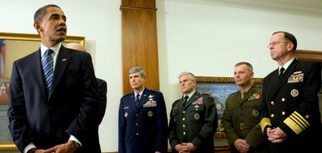
2012 PENTAGON REPORT WARNED OBAMA WAS CREATING ISIS
Predicted current policies would lead to Islamic state in SyriaPublished: 3 hours ago Aug 2016 ART MOORE About | Email Donald Trump’s declaration this week at a campaign rally that President Obama and Hillary Clinton “founded” ISIS drew outrage from establishment media, and the Republican nominee now insists he was being sarcastic, but a Defense Intelligence Agency document declassified last year shows the Obama administration was warned in 2012 that if it continued its policies, a radical Islamic regime could form in Eastern Syria. Writing in Chronicles magazine, Jim Jatras, a former U.S. diplomat and foreign policy adviser to the Senate GOP leadership, cited a DIA report in August 2012 that was declassified and released last year under a Freedom of Information Act request from Judicial Watch. Hillary Clinton was secretary of state at the time under President Obama. The report said “there is the possibility of establishing a declared or undeclared Salafist principality in Eastern Syria, and this is exactly what the supporting powers to the opposition want, in order to isolate the Syrian regime.” The Obama administration’s “willful blindness” is exposed as never before from the inside in “See Something, Say Nothing: A Homeland Security Officer Exposes the Government’s Submission to Jihad,” by former DHS officer Philip Haney and WND Editor Art Moore. The “supporting powers” are identified as “the West, Gulf countries, and Turkey.” Jatras, as Robert Spencer’s Jihad Watch blog reported, summarized the report saying that if the U.S. and its proxies kept aiding al-Qaida, the Muslim Brotherhood and other “rebel” groups fighting the Syrian regime of President Bashar al-Assad, a jihadist state would arise in the country. Several months later, ISIS declared itself a state straddling the Syria-Iraq border. Report ‘made no difference’ Jatras pointed out that Lt. Gen. Michael Flynn, currently a Trump adviser, took over as head of DIA a month before the report was issued. “Whether it was his personal effort to caution the administration or simply the professional analysts in the DIA apparatus laying out the facts as they saw them, the 2012 report made no difference,” Jatras writes. In an interview last year with Mehdi Hasan of Al Jazeera, Flynn said the formation of an ISIS state wasn’t a matter of the administration turning a “blind eye.” It was a “willful decision.” Hasan: You are basically saying that even in government at the time you knew these groups were around, you saw this analysis, and you were arguing against it, but who wasn’t listening? Flynn: I think the administration. Hasan: So the administration turned a blind eye to your analysis? Flynn: I don’t know that they turned a blind eye, I think it was a decision. I think it was a willful decision. Hasan: A willful decision to support an insurgency that had Salafists, Al Qaeda and the Muslim Brotherhood? Flynn: It was a willful decision to do what they’re doing. Islamic state a ‘strategic opportunity’ In May 2015, Nafeez Ahmed, an investigative journalist and international security scholar, reported the DIA document provided “no indication of any decision to reverse the policy of support to the Syrian rebels.” “On the contrary, the emergence of an al-Qaeda affiliated ‘Salafist Principality’ as a result is described as a strategic opportunity to isolate Assad.” Ahmed noted that at the time, media reports focused on the report’s evidence that the Obama administration knew of arms supplies from a Libyan terrorist stronghold to rebels in Syria. He wrote that the DIA document “confirms that the main component of the anti-Assad rebel forces by this time comprised Islamist insurgents affiliated to groups that would lead to the emergence of ISIS.” “Despite this, these groups were to continue receiving support from Western militaries and their regional allies,” he wrote. Ahmed said the Pentagon document explicitly forecasted the declaration of “an Islamic State through its union with other terrorist organizations in Iraq and Syria.” Nevertheless, “Western countries, the Gulf states and Turkey are supporting these efforts” by Syrian “opposition forces” fighting to “control the eastern areas (Hasaka and Der Zor), adjacent to Western Iraqi provinces (Mosul and Anbar).” Ahmed said that in response to his questions about the strategy, the British government “simply denied the Pentagon report’s startling revelations of deliberate Western sponsorship of violent extremists in Syria.” A British Foreign Office spokesman told him: AQ (Al-Qaida) and ISIL (ISIS) are proscribed terrorist organisations. The UK opposes all forms of terrorism. AQ, ISIL, and their affiliates pose a direct threat to the UK’s national security. We are part of a military and political coalition to defeat ISIL in Iraq and Syria, and are working with international partners to counter the threat from AQ and other terrorist groups in that region. In Syria we have always supported those moderate opposition groups who oppose the tyranny of Assad and the brutality of the extremists. The DIA, Ahmed said, did not respond to his request for comment. The Obama administration’s “willful blindness” is exposed as never before from the inside in “See Something, Say Nothing: A Homeland Security Officer Exposes the Government’s Submission to Jihad,” by former DHS officer Philip Haney and WND Editor Art Moore. Read more at Avi Lipkin: Islamic Rivalry, Part 1
Published on Jul 7, 2015 Israeli insider, Avi Lipkin, is usually way ahead of the curve. During a recent visit with Gary he took a look at ISIS and their violent march across the Middle East. They aren’t going away any time soon. They have their eyes on Jordan and then Saudi Arabia. Can they be stopped? Soon they will control all of the territory surrounding the Land of Israel. Will Israel do battle with ISIS soon? Published on Jun 25, 2015
Change the Channel. What happens if the Iran Nuclear agreement goes bad? Ever wondered what a bad nuclear deal looks like? Change the Channel is a fast-moving look through the eyes of our news channels at the growing turmoil and eventual destruction wrought by a nuclear Iran on the Middle East and beyond. Even America isn't safe. |
|
